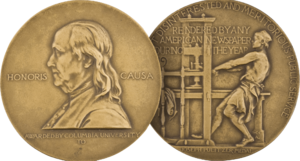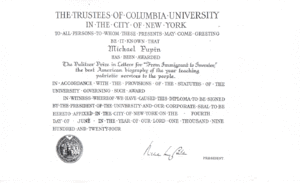Pulitzer Prize facts for kids
Quick facts for kids Pulitzer Prize |
|
|---|---|

Obverse and reverse sides of the Pulitzer Prize for Public Service gold medal, designed by sculptor Daniel Chester French in 1917
|
|
| Presented by | Columbia University |
| Country | United States |
| First awarded | June 4, 1917 |
The Pulitzer Prizes are important awards given out every year in the United States. They celebrate great work in "journalism, arts, and letters." These awards are given by Columbia University in New York City.
The prizes were started in 1917 by Joseph Pulitzer. He was a very successful newspaper publisher. He left money in his will to create these awards.
In 2024, prizes were given in 23 different areas. For each area, three finalists were chosen, and then one winner was picked.
- Audio Reporting
- Biography
- Breaking News Reporting
- Breaking News Photography
- Commentary
- Criticism
- Drama
- Editorial Writing
- Explanatory Reporting
- Feature Photography
- Feature Writing
- Fiction
- General Nonfiction
- History
- Illustrated Reporting and Commentary
- International Reporting
- Investigative Reporting
- Local Reporting
- Memoir or Autobiography
- Music
- National Reporting
- Poetry
- Public Service
Most winners receive a certificate and $15,000. However, the winner in the Public Service category gets a special gold medal.
Contents
The Story of the Pulitzer Prizes

The Pulitzer Prizes began because of newspaper publisher Joseph Pulitzer. He wanted to support good journalism and writing. In his will, he left money to Columbia University. This money was used to start a journalism school and create the Pulitzer Prizes.
He set aside $250,000 for the prizes and scholarships. He wanted four awards for journalism, four for literature and drama, one for education, and four travel scholarships.
Joseph Pulitzer passed away on October 29, 1911. The very first Pulitzer Prizes were given out on June 4, 1917. Today, the winners are usually announced in May.
For many years, the Chicago Tribune newspaper did not want to compete for the Pulitzer Prize. Its leader, Colonel Robert R. McCormick, thought the prize was not serious. The paper did not enter until 1961.
How Winners Are Chosen

The Pulitzer Prize does not automatically consider every great work. People or organizations must specifically enter their work for it to be reviewed. Entries must fit into one of the specific prize categories. A work can only be entered in up to two categories.
For books, plays, and music, the person who created the work must be a United States citizen or a permanent resident. Also, their work must be published by a company based in the United States. For journalism awards, the person does not have to be a U.S. citizen. However, their work must have been published in a U.S.-based newspaper, magazine, or news website.
The Jury and Board Decisions
Each year, more than 100 experts are chosen to be "jurors." They work on 22 different juries for the 23 award categories. Most juries have five members. Some categories, like Public Service or Investigative Reporting, have seven members.
For each award, the jury chooses three "nominated finalists." Then, the Pulitzer Prize Board picks the winner from these three finalists. The board can also choose a different entry if 75% of them agree. Sometimes, the board decides not to give an award in a category. The jurors and board members are not paid for their work, except for those in literature, music, and drama categories.
Entrants vs. Nominated Finalists
If someone's work is sent in for the prize, they are called an entrant. The jury then selects a smaller group called nominated finalists. These finalists are announced along with the winner.
It is important to know the difference. Some people who were only "entrants" might say they were "nominated" for a Pulitzer. However, the Pulitzer Board says that only the "nominated finalists" are truly nominated. If your work was just submitted, you were an "entrant," not a "nominee."
For example, if a movie is sent to the Academy Awards, the people who made it are "entrants." But only the movies chosen by the Academy as finalists are "nominees." The Pulitzer Prizes work in a similar way.
The Pulitzer Prize for Public Service is usually given to news organizations, not individuals. However, sometimes the people who contributed to that winning work are mentioned. Other journalism awards can be given to individuals, newspapers, or newspaper teams.
Award Categories
The Pulitzer Prizes are given in categories related to journalism, arts, and literature. News reports and photos from U.S.-based newspapers, magazines, and news websites are eligible for journalism prizes.
Since 2007, online content like videos or multimedia presentations can be part of entries in most journalism categories. In 2008, for the first time, content from news sources that are only online could be considered.
For a long time, magazines were not allowed to enter the Pulitzer competition. This led to the creation of the National Magazine Awards in 1966. However, in 2015, magazines were allowed to enter two categories: Investigative Reporting and Feature Writing. By 2016, this expanded to more categories. In October 2016, magazines became eligible for all journalism categories.
Here are some of the main Pulitzer Prize categories:
Journalism Awards
- Public Service – This is for excellent public service by a newspaper, magazine, or news site. It's often seen as the top prize. It's the only Pulitzer award given as a gold medal.
- Breaking News Reporting – For quickly and accurately reporting on important local, state, or national events as they happen.
- Investigative Reporting – For deep, detailed reporting that uncovers important information.
- Explanatory Reporting – For clearly explaining a complex topic, showing great understanding and clear writing.
- Local Reporting – For excellent reporting on important issues in a local community.
- National Reporting – For excellent reporting on important issues across the United States.
- International Reporting – For excellent reporting on international events and issues.
- Feature Writing – For well-written, original, and concise feature stories.
- Commentary – For excellent opinion pieces or analysis.
- Criticism – For excellent reviews or critiques of arts, culture, or other topics.
- Editorial Writing – For well-written editorials that show clear style, strong purpose, good reasoning, and influence public opinion.
- Editorial Cartooning – For an excellent cartoon or collection of cartoons that are original and effective.
- Breaking News Photography – For outstanding photos of breaking news events.
- Feature Photography – For outstanding feature photos.
Arts and Letters Awards
There are seven categories for books and plays:
- Biography – For an excellent biography, autobiography, or memoir by an American author.
- Drama – For an excellent play by an American playwright, especially if it's original and about American life.
- Fiction – For excellent fiction by an American author, preferably about American life.
- General Nonfiction – For an excellent and well-researched nonfiction book by an American author that doesn't fit into other categories.
- History – For an excellent and well-researched book on the history of the United States.
- Memoir or Autobiography – For an excellent and factual memoir or autobiography by an American author.
- Poetry – For an excellent book of original poems by an American poet.
In 2020, the Audio Reporting category was added. The first prize in this category went to an episode of the radio program This American Life.
Music Award
There is one prize for music:
- Pulitzer Prize for Music – For an excellent musical piece by an American composer. The piece must have been performed or recorded for the first time in the U.S. during the year.
Besides the main prizes, there are also Special Citations and Awards. These are given for unique contributions in journalism, arts, and letters.
Also, four "Pulitzer Traveling Fellowships" are given to outstanding students at the Graduate School of Journalism.
Changes to Categories Over Time
Over the years, some award categories have changed or been stopped. This happens when the field expands, the name changes, or the award becomes outdated. For example, the Pulitzer Prize for the Novel (given from 1918–1947) became the Pulitzer Prize for Fiction. This new category includes not just novels, but also short stories and other types of fiction.
Chronology of Pulitzer Prize categories
| 1910s | 1920s | 1930s | 1940s | 1950s | 1960s | 1970s | 1980s | 1990s | 2000s | 2010s | 2020s | Current Categories | |||||||||||||||||||||||||||||||||||||||||||||||||||||||||||||||||||||||||||||||||||||||||||||||
|---|---|---|---|---|---|---|---|---|---|---|---|---|---|---|---|---|---|---|---|---|---|---|---|---|---|---|---|---|---|---|---|---|---|---|---|---|---|---|---|---|---|---|---|---|---|---|---|---|---|---|---|---|---|---|---|---|---|---|---|---|---|---|---|---|---|---|---|---|---|---|---|---|---|---|---|---|---|---|---|---|---|---|---|---|---|---|---|---|---|---|---|---|---|---|---|---|---|---|---|---|---|---|---|---|---|---|---|
| 17 | 18 | 19 | 20 | 21 | 22 | 23 | 24 | 25 | 26 | 27 | 28 | 29 | 30 | 31 | 32 | 33 | 34 | 35 | 36 | 37 | 38 | 39 | 40 | 41 | 42 | 43 | 44 | 45 | 46 | 47 | 48 | 49 | 50 | 51 | 52 | 53 | 54 | 55 | 56 | 57 | 58 | 59 | 60 | 61 | 62 | 63 | 64 | 65 | 66 | 67 | 68 | 69 | 70 | 71 | 72 | 73 | 74 | 75 | 76 | 77 | 78 | 79 | 80 | 81 | 82 | 83 | 84 | 85 | 86 | 87 | 88 | 89 | 90 | 91 | 92 | 93 | 94 | 95 | 96 | 97 | 98 | 99 | 00 | 01 | 02 | 03 | 04 | 05 | 06 | 07 | 08 | 09 | 10 | 11 | 12 | 13 | 14 | 15 | 16 | 17 | 18 | 19 | 20 | 21 | 22 | 23 | |
| Journalism | Journalism | ||||||||||||||||||||||||||||||||||||||||||||||||||||||||||||||||||||||||||||||||||||||||||||||||||||||||||
| 17 | 19 | 21 | Editorial Writing | 30 | 32 | 35 | 81 | 93 | 08 | 12 | Editorial Writing | ||||||||||||||||||||||||||||||||||||||||||||||||||||||||||||||||||||||||||||||||||||||||||||||||
| 17 | 19 | Reporting | 28 | 47 | – | ||||||||||||||||||||||||||||||||||||||||||||||||||||||||||||||||||||||||||||||||||||||||||||||||||||||
| 17 | 20 | 25 | 30 | Public Service | Public Service | ||||||||||||||||||||||||||||||||||||||||||||||||||||||||||||||||||||||||||||||||||||||||||||||||||||||
| 18 | Newspaper History | – | |||||||||||||||||||||||||||||||||||||||||||||||||||||||||||||||||||||||||||||||||||||||||||||||||||||||||
| 22 | 23 | Editorial Cartooning | 36 | 60 | 65 | 73 | 20 | 21 | 22 | Illustrated Reporting and Commentary | |||||||||||||||||||||||||||||||||||||||||||||||||||||||||||||||||||||||||||||||||||||||||||||||||
| 29 | Correspondence | 47 | – | ||||||||||||||||||||||||||||||||||||||||||||||||||||||||||||||||||||||||||||||||||||||||||||||||||||||||
| Telegraphic Reporting – International | 42 | 47 | 48 | International Reporting | 77 | International Reporting | |||||||||||||||||||||||||||||||||||||||||||||||||||||||||||||||||||||||||||||||||||||||||||||||||||||
| Telegraphic Reporting – National | 42 | 43 | 47 | 48 | 51 | National Reporting | National Reporting | ||||||||||||||||||||||||||||||||||||||||||||||||||||||||||||||||||||||||||||||||||||||||||||||||||||
| 42 | Photography | 67 | 68 | Spot News Photography | 99 | 00 | Breaking News Photography | Breaking News Photography | |||||||||||||||||||||||||||||||||||||||||||||||||||||||||||||||||||||||||||||||||||||||||||||||||||
| 68 | Feature Photography | Feature Photography | |||||||||||||||||||||||||||||||||||||||||||||||||||||||||||||||||||||||||||||||||||||||||||||||||||||||||
| 48 | Local Reporting | 52 | 53 | Local Reporting – Edition Time | 63 | 64 | Local General or Spot News Reporting | 84 | 85 | General News Rep. | 90 | 91 | Spot News Reporting | 97 | 98 | Breaking News Reporting | 11 | Breaking News Reporting | |||||||||||||||||||||||||||||||||||||||||||||||||||||||||||||||||||||||||||||||||||||||||
| 53 | Local Reporting – No Edition Time | 63 | 64 | Local Investigative Specialized Reporting | 84 | 85 | Investigative Reporting | Investigative Reporting | |||||||||||||||||||||||||||||||||||||||||||||||||||||||||||||||||||||||||||||||||||||||||||||||||||
| 70 | Commentary | Commentary | |||||||||||||||||||||||||||||||||||||||||||||||||||||||||||||||||||||||||||||||||||||||||||||||||||||||||
| 70 | Criticism | 92 | Criticism | ||||||||||||||||||||||||||||||||||||||||||||||||||||||||||||||||||||||||||||||||||||||||||||||||||||||||
| 79 | Feature Writing | 04 | 14 | Feature Writing | |||||||||||||||||||||||||||||||||||||||||||||||||||||||||||||||||||||||||||||||||||||||||||||||||||||||
| 85 | Explanatory Journalism | 97 | 98 | Explanatory Reporting | Explanatory Reporting | ||||||||||||||||||||||||||||||||||||||||||||||||||||||||||||||||||||||||||||||||||||||||||||||||||||||
| 85 | Specialized Reporting | 90 | 91 | Beat Reporting | 06 | 07 | Local Reporting | Local Reporting | |||||||||||||||||||||||||||||||||||||||||||||||||||||||||||||||||||||||||||||||||||||||||||||||||||
| 20 | Audio Reporting | ||||||||||||||||||||||||||||||||||||||||||||||||||||||||||||||||||||||||||||||||||||||||||||||||||||||||||
| Letters • Drama • Music | Letters • Drama • Music | ||||||||||||||||||||||||||||||||||||||||||||||||||||||||||||||||||||||||||||||||||||||||||||||||||||||||||
| 17 | Biography or Autobiography | 62 | 22 | 23 | Biography | ||||||||||||||||||||||||||||||||||||||||||||||||||||||||||||||||||||||||||||||||||||||||||||||||||||||
| 23 | Memoir or Autobiography | ||||||||||||||||||||||||||||||||||||||||||||||||||||||||||||||||||||||||||||||||||||||||||||||||||||||||||
| 17 | 19 | History | 84 | 94 | History | ||||||||||||||||||||||||||||||||||||||||||||||||||||||||||||||||||||||||||||||||||||||||||||||||||||||
| 62 | General Nonfiction | General Nonfiction | |||||||||||||||||||||||||||||||||||||||||||||||||||||||||||||||||||||||||||||||||||||||||||||||||||||||||
| 17 | 20 | Novel | 41 | 46 | 47 | 48 | Fiction | 54 | 57 | 64 | 71 | 74 | 77 | 12 | Fiction | ||||||||||||||||||||||||||||||||||||||||||||||||||||||||||||||||||||||||||||||||||||||||||||
| 22 | Poetry | 46 | Poetry | ||||||||||||||||||||||||||||||||||||||||||||||||||||||||||||||||||||||||||||||||||||||||||||||||||||||||
| 17 | 19 | Drama | 42 | 44 | 47 | 51 | 63 | 64 | 66 | 68 | 72 | 74 | 86 | 97 | 06 | Drama | |||||||||||||||||||||||||||||||||||||||||||||||||||||||||||||||||||||||||||||||||||||||||||
| 43 | Music | 53 | 64 | 65 | 81 | Music | |||||||||||||||||||||||||||||||||||||||||||||||||||||||||||||||||||||||||||||||||||||||||||||||||||||
| Special Awards & Citations | Special Awards & Citations | ||||||||||||||||||||||||||||||||||||||||||||||||||||||||||||||||||||||||||||||||||||||||||||||||||||||||||
| 24 | 30 | 38 | 41 | 44 | 45 | 47 | 51 | 52 | 53 | 58 | 64 | 78 | 96 | 19 | 20 | 21 | 22 | For journalism | |||||||||||||||||||||||||||||||||||||||||||||||||||||||||||||||||||||||||||||||||||||||||
| 18 | 19 | 57 | 60 | 61 | 73 | 77 | 78 | 84 | 92 | 06 | 07 | For letters | |||||||||||||||||||||||||||||||||||||||||||||||||||||||||||||||||||||||||||||||||||||||||||||||
| 44 | 74 | 76 | 82 | 85 | 98 | 99 | 06 | 07 | 08 | 10 | 19 | For music | |||||||||||||||||||||||||||||||||||||||||||||||||||||||||||||||||||||||||||||||||||||||||||||||
| 44 | 47 | 48 | 76 | 87 | For service | ||||||||||||||||||||||||||||||||||||||||||||||||||||||||||||||||||||||||||||||||||||||||||||||||||||||
Legend Awarded, current category Awarded, category renamed and is current category Awarded, category no longer exists Nominees selected but category was not awarded Note: The Pulitzer Prize for Local Reporting was split into two categories in 1948 that still exist as Breaking News Reporting and Investigative Reporting. The Local Reporting category was revived in 2007 as a new category to replace the Beat Reporting category.
The Pulitzer Prize Board

The Pulitzer Prize Board has nineteen members. They meet twice a year at Columbia University. The board includes important editors, writers, and media leaders. It also has six members from universities and the arts. The president of Columbia University and the dean of the Columbia University Graduate School of Journalism are also on the board. The person who manages the prizes is the board's secretary.
The president and dean are permanent members. Other members are chosen for three-year terms and can serve up to three terms. The board makes sure to choose members who are excellent in their fields and represent different backgrounds and types of news organizations.
Since 1975, the board has made all the final prize decisions. Before that, the decisions had to be approved by the Trustees of Columbia University. Even though the Pulitzer Prize office is at Columbia University, the board and its staff have been separate from the journalism school since 1950.
More to Explore
- Alfred I. duPont–Columbia University Award for broadcast journalism
- Commonwealth Writers Prize
- List of Pulitzer Prizes awarded to The New York Times
- List of prizes known as the Nobel or the highest honors of a field
- The Booker Prize
- Miguel de Cervantes Prize
- National Book Award
- National Magazine Awards
- Prix Goncourt
See also
 In Spanish: Premio Pulitzer para niños
In Spanish: Premio Pulitzer para niños
 | Kyle Baker |
 | Joseph Yoakum |
 | Laura Wheeler Waring |
 | Henry Ossawa Tanner |

